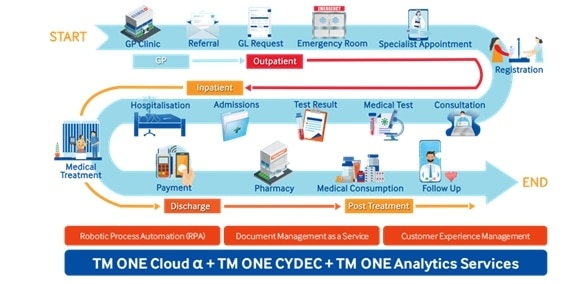
The COVID-19 outbreak has placed a massive strain on the global healthcare sector’s workforce, infrastructure, and supply chain. Medical practitioners are exhausted, and healthcare systems are forced beyond limits to the brink of breaking down. Despite the many challenges, a decrease in revenues and rising operational costs, healthcare players continue to push forward, committed in providing high quality healthcare services to patients. Nonetheless, the pandemic has exposed the shortcomings of healthcare systems worldwide. Striking at the nation-building heart of many countries, the pandemic has significantly disrupted social, political, economic and healthcare systems around the world.
However, we have also seen the emergence of foundational shifts arising from COVID-19. Needle mover initiatives are being made globally by both public and private sectors, recognising the need to relook healthcare ecosystem modernisation towards a comprehensive, integrated digitisation and digitalisation. New coping strategies, involving the accelerated adoption of telemedicine, smart health and other technologies, are considered as imperatives. Amid these dynamics, public sectors, healthcare providers, players, and other stakeholders around the globe are being challenged to pivot, adapt, and innovate at speed to amplify the reach and effectiveness of healthcare.
A smart health approach typically makes use of interconnected technologies to embrace the entire spectrum of healthcare providers, consumers and researchers to ensure the delivery of cutting-edge care that is comprehensive, collaborative, efficient – recognising the needs of patients and their families as well as healthcare practitioners and administrators. The use of telemedicine, complemented by analytics, artificial intelligence (AI), data protection and scalable cloud ecosystem is gaining traction. The pandemic has opened doors for AI and other digital technologies to solve complex clinical and non-clinical problems.
A recent report published by McKinsey & Company highlights that telehealth utilisation has stabilised at levels 38X higher than before the pandemic. Similarly, consumer and provider attitudes toward telehealth have also improved. Investment in virtual care and digital health have broadly skyrocketed. Additionally, virtual healthcare models and business models are continuing to evolve.
However, some hurdles, such as concerns around technology security, need to be addressed. TM One has innovated a complete ecosystem of healthcare solutions, which is modular and interoperable with external systems connected via TM One Cloud α (pronounced as Cloud Alpha) and TM One Cybersecurity (CYDEC) to ensure world class security. McKinsey points out that, the ‘digital front door’ will not be closing as patients and providers have appreciated and embraced the convenience and flexibility of this type of care especially during the healthcare crisis. As we gradually move through and onwards into recovery, a key concern for any health system will be scaling and sustaining these digital interactions.
Consumers expect industry leaders to leverage on the momentum created in the pandemic to continue to propel healthcare forward, especially as good healthcare services is a key hallmark of sustainable future ready nation building. According to Deloitte, collaborations and the human experience are two (2) of six (6) pressing sector issues that are expected to shape and navigate the healthcare industry into and through the evolving ‘next normal’.
Healthcare technologies, which especially appeal to the digital first generation, has inspired deeper levels of activity, engagement and enhanced patient experience. A visit to the doctor is already a worrying experience for some without having to deal with the paperwork, hours of waiting time and patient care. On a wider front, consumers are using technology to monitor their health, measure fitness, order prescriptions and schedule doctor’s appointments. Eighty percent (80%) of consumers report that they are most likely to have another virtual visit even post pandemic. Pandemic experience has shown that the best path to effectively enabling digital solutions requires various levels of smart collaboration moving away from siloed record systems. Providing a comprehensive end-to-end integrated patients experience management platform with insights, one which is truly beneficial for consumers and patients -- calls for collaborative arrangements, which embrace data platforms, disruptive entrants, public/private partnerships, and health system platforms integration.

TM One Healthcare understands the complexities of the healthcare industry. It will simplify the electronic medical records platform, and channel patients, healthcare providers and funders into a single, secured, standardised and cost-effective solution. With extensive experience in rolling out clinic management systems and electronic medical records, together with a dedicated team to maintain and provide adequate support to end users and partners, TM One Healthcare will ensure the best experience for all stakeholders.